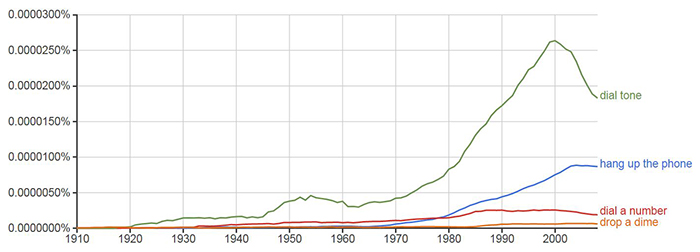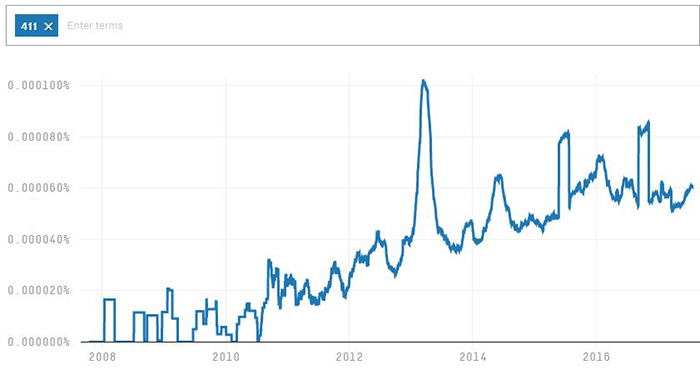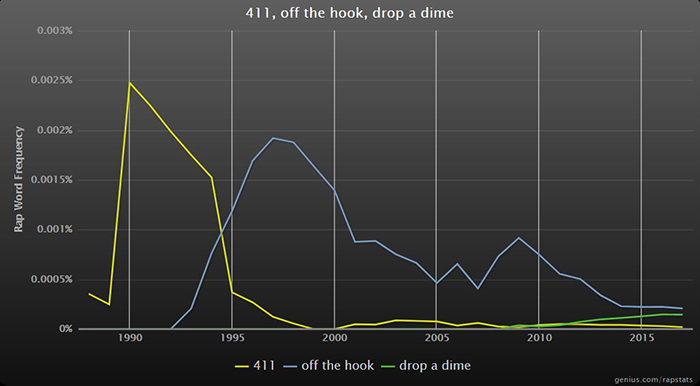10 telephone slang terms that kids don’t understand

Technology is changing faster than ever. In particular, telephone technology has rapidly evolved in a relatively short period. Whether you’re considering the history of telephone design or the evolution of VoIP, Mental Floss’ Jason English summed it up with this tweet:
“My daughter just asked why we say ‘hang up’ the phone and now I feel 90.”
Even as the technology continues to move forward, let’s consider some telephone terminology that’s lingering. Whether you’re a curmudgeon who’s confused by “kids these days,” or you’re a youngster who wants to learn some telephone history, here’s a roundup of telephone slang terms that kids just don’t understand.
1. Hang Up the Phone
Tapping the “end call” button on your cell phone is still referred to as hanging up the phone. However, there’s no literal hanging involved.
To explain, hanging up a call used to mean hanging the handheld receiver onto the wall-mounted phone body to disconnect the call. The closest thing that we have to that today is with a DP1 wireless home business desk phone where you can end a call by placing the receiver back in the cradle.
2. Busy Signal
Don’t know what a busy signal is? That’s because we’re living in a time when most telephone providers offer call waiting. Previously, if you were calling someone who was already on another phone call, the call wouldn’t connect, and you’d hear a busy signal instead.
Back in 1991, a Washington Post article noted that 30+ percent of area homes had call waiting, and the people quoted in the article foreshadowed the mixed feelings that are common in today’s always-available culture. “It’s annoying when my conversation is interrupted,” said one mom who used call waiting. “But it’s also annoying when someone doesn’t have it, and I can’t get through to them.”
3. Dial a Number
There’s no actual dial when making a call with today’s numeric keypads. The phrase dates back to the dials that were on rotary phones. To make a call, you’d turn the numbered dial for each digit of the telephone number. This technology predated the touch-tone system, and it functioned because the rotary dial generated electrical pulses that were recognized by the network.
The language of placing a call by “dialing a number” remains. To put it in context, check out how painful it is to watch two teens try to dial a number on a rotary phone.
4. Wait for the Dial Tone
Previously, the first step of making a call was to pick up the receiver and check for a dial tone. This monotone sound was how users knew the phone line was working.
The phrase has been around since the 1940s, following the automation of phone networks to no longer rely upon human telephone operators. The sound of a dial tone is very recognizable pitch, and it’s the first tone of a dial-up modem connecting to the internet.
5. 411
In a time before Google, you needed a phone book to look up a phone number. However, there was a separate phone book for each geographical region. This meant that phone numbers were harder to locate.
Since the 1930s, dialing 411 has been a way to call information and get a phone number or other directory assistance. While dialing 411 still works today, it’s more likely that you’ll hear 411 being used as slang for information, as in finding out the inside scoop on something.
6. I’m in the Book
No, this phrase isn’t a reference to Facebook; it’s about phone books.
In each telephone book, the white pages contained an alphabetical directory of all the households in the city along with their landline phone numbers. Saying “I’m in the book” is a shortened way of saying, “you can find my contact info in the phone book if you want to get in touch.”
7. Let Your Fingers Do the Walking
Another reference to the phone book, this slogan was part of the advertising campaign of the Yellow Pages.
The Yellow Pages portion of the phone book was a directory of businesses listed by category, such as plumbers or museums. Even though it’s been used since the sixties, the symbol of “walking fingers” is one of the most famous symbols to never be trademarked. It inspired classic TV commercials such as this one from a classic 1970 jingle.
8. Phone off the Hook
Before phones had do not disturb mode, you’d take the phone receiver off the hook when you didn’t want to be bothered. This would prevent any incoming calls from connecting.
As the Stones explained in their song Off the Hook, taking the phone off the hook is an old-fashioned version of ghosting.
9. Drop a Dime
Dropping a dime is a slang way to say that someone snitched or betrayed someone. The term dates back to the 1960s, when it cost 10 cents to make a payphone call, which was how you could report something anonymously.
The late William Safire pondered on this phrase in 1998 noting that even though payphone calls cost more than 10-cents, “metaphors do not take seasonal or even generational adjustment.”
10. Telephone Is Ringing
While custom ringtones are a common feature of incoming calls, why do we say that a phone is ringing and not beeping?
This terminology dates back to when phones had actual bells that would ring to indicate an incoming call. It worked via an electrically controlled magnet switch that would vibrate a mechanical clapper against the bell. Even in the 1800s, early telephones such as Thomas Edison’s wall phones would ring because of the bell mounted on the top.
Are These Telephone Slang Terms Ancient History?
To understand the popularity of these phrases over time, we ran them through Google Ngram to see their usage in books over time.
 Google – Google
Google – GoogleThe phrase “dial tone” is still the most popular; however, it’s quickly declining.
Google’s graph for the term “411” was skewed because it’s a number and was shown as being used far before phones were invented. Therefore, we turned to FiveThirtyEight’s tool that analyzes the language used on Reddit, and we see that its use is increasing.
 FiveThirtyEight – FiveThirtyEight
FiveThirtyEight – FiveThirtyEightFurther still, some of these telephone slang words have been popularized with reinterpreted meanings that go beyond phones. In particular, the phrases “drop a dime,” “411,” and “off the hook” are used in popular culture and music lyrics.
Using Rap Genius, we analyzed how the terms have been used in rap lyrics, and there’s a clear timeline of popularity. Usage of “411” peaked in the early ‘90s; “off the hook” peaked in the late ‘90s; and “drop a dime” hasn’t peaked.
 Genius – Genius
Genius – GeniusThe language of telephone slang may be ever changing, but high-quality telephone service is better than ever. Learn how you can use Ooma residential and VoIP service to make unlimited U.S. calls for a few dollars per month. Use Ooma with your home phone and on your mobile device with Ooma’s free calling app.



